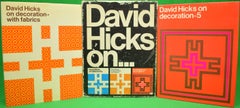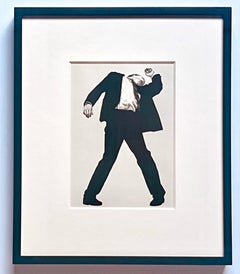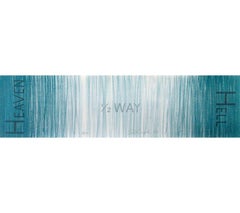David Hicks More Art
Let there be no doubt about it, suave as he was, with his bespoke suits, slicked-back hair and patrician good looks, David Nightingale Hicks (1929–98) was a committed revolutionary. Composing rooms of arresting opulence through his magisterial orchestration of cacophonous colors and patterns, Italian modern mixed with Louis XV furnishings and counterintuitive plays of scale, he forever rocked the stately world of interior design.
As a zealot of style, he took no prisoners. “Dedication to design means ruthless criticism and losing friends,” he once declared. He was not exaggerating. His wife claimed that he conceived his signature high-gloss brown walls as a result of her throwing glasses of Coca-Cola at him during their alarmingly frequent marital spats.
By the time he was 25, Hicks, who had attended London’s Central School of Art and Design and endured a couple of arid years in the art department of the advertising agency J. Walter Thompson, had the crème de la crème of London society as clients — and he was being entertained by them! Within a few years, he was courting Lady Pamela Mountbatten, the daughter of Lord Mountbatten, the last British viceroy of India, and the uncle of Prince Phillip, Queen Elizabeth’s husband. They married in 1960 and acquired Britwell, a Georgian pile in Oxfordshire, which became the family seat, design lab and showplace.
The first truly modern interior Hicks ever designed was Lord John Cholmondeley’s penthouse overlooking Hyde Park, in 1967. The graphic boldness of the scheme — brightly colored walls outlined in dark hues and dynamic geometric-patterned carpets — echoed the energy and attitude of the hard-edge painting that was then at the fore. Here, as in all his interiors, he included what he called “tablescapes,” vignettes of artfully arranged objects and artworks that added interest and life to the room. They were soon widely copied. Another landmark interior came in the early 1970s, when he revived Baronscourt, a grand neoclassical house in Northern Ireland, by giving it an entirely contemporary decor.
In addition to his immense creative talent, Hicks had a keen entrepreneurial acumen and vision. While he could have made a fine business simply designing grand homes for the wealthy and titled, he expanded his studio to include offices, boutiques, restaurants, hotels and nightclubs. He had showrooms all over the world, and he embarked on licensing agreements for ranges of vividly hued, geometric-patterned sheets and towels, clothes, umbrellas and bags.
The British designer was as daring as he was debonair, deploying a brazen mix of colors and patterns that came to define the groovy-glamorous interiors of the Swinging Sixties.
Find David Hicks furniture on 1stDibs.
1970s David Hicks More Art
Paper
1980s Pop Art David Hicks More Art
Photographic Paper, Pencil, Graphite
1980s Contemporary David Hicks More Art
Paper
20th Century Abstract David Hicks More Art
Paper, Offset
21st Century and Contemporary Contemporary David Hicks More Art
Paper
1910s Impressionist David Hicks More Art
Watercolor, Archival Paper
21st Century and Contemporary Contemporary David Hicks More Art
Paper, Color, Lithograph, Offset
21st Century and Contemporary Contemporary David Hicks More Art
Paper
1960s Contemporary David Hicks More Art
Paper
1960s Contemporary David Hicks More Art
Paper
1980s Impressionist David Hicks More Art
Paper, Watercolor
Early 2000s Modern David Hicks More Art
Paper
17th Century Baroque David Hicks More Art
Crayon, Paper


